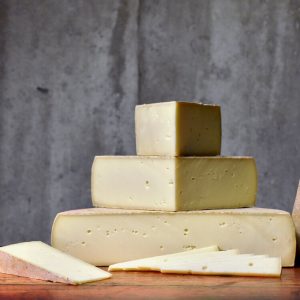Blue Diamond Growers Participates in Rose Parade
 Blue Diamond Growers, the world’s leading almond marketer and processor, is participating in the 2023 Rose Parade presented by Honda, an iconic annual event held in Pasadena, Calif., on Jan 2. For the fifth year in a row, the Sacramento-based co-op will honor the people and pollinators that make Blue Diamond almond products possible, highlighting the farmer-owned cooperative’s commitment to sustainability, pollinators, and biodiversity with a custom-built float brimming with fresh flowers and featuring Blue Diamond almond growers.
Blue Diamond Growers, the world’s leading almond marketer and processor, is participating in the 2023 Rose Parade presented by Honda, an iconic annual event held in Pasadena, Calif., on Jan 2. For the fifth year in a row, the Sacramento-based co-op will honor the people and pollinators that make Blue Diamond almond products possible, highlighting the farmer-owned cooperative’s commitment to sustainability, pollinators, and biodiversity with a custom-built float brimming with fresh flowers and featuring Blue Diamond almond growers.
Meticulously built to honor the almond pioneer’s past, present, and future, Blue Diamond will charm Rose Parade spectators with a colorful float that pays tribute to not only the almonds that sustain its growers and nourish its consumers but also to the pollinators that are vital for their success.
“We’re thrilled to be back for the Rose Parade! This year’s float is an unparalleled representation of the passion and hard work of our Grower members,” said Raj Joshi, SVP global consumer division for Blue Diamond Growers. “We are incredibly honored to share this moment with the almond grower-owners riding our float, bringing the whole display to life, and our thousands of members who will be watching from home. Blue Diamond’s California legacy keeps growing thanks to them.”
Spectators will be charmed with the enormous representations of the brand’s Almond Breeze Almondmilk and the signature Smokehouse-flavored Blue Diamond Almonds, a rollercoaster and an animated, spinning Ferris wheel. As the float makes its way down the streets of Pasadena, Blue Diamond has been intentional in ensuring that one element stands out: the honeybees. By creating joyful bees from thousands of flowers, the Sacramento-based co-op reinforces its commitment to partnerships that support honeybee health, such as Project Apis m. and Pollinator Partnership, and its leadership in using pollinator-friendly plantings in growers’ orchards to advance biodiversity and climate-smart agriculture.
This year’s eye-catching design will consist of more than 20,000 flowers, including over 10,000 pink and orange roses, hundreds of gladiolas, lilies, and orchids as well as a variety of seeds, beans, and almond shells. The float will also feature a unique component: the heart and soul of Blue Diamond, its growers. Twelve almond growers will ride alongside the float, representing the more than 3,000 dedicated growers in the California co-op – making it one of the world’s leading agricultural co-ops.
Lovingly known as America’s New Year Celebration, the iconic Rose Parade is celebrating its 134th anniversary. With this year’s theme, “Turning the Corner,” Blue Diamond also takes an opportunity to celebrate what the new year means to them: the long-awaited almond bloom that happens every February in central California, signaling a new year for the almond cycle, and a renewed opportunity to keep growing a better tomorrow through innovative sustainable farming practices.
Nothing denotes turning the corner more for Blue Diamond than fragrant almond blossoms, well-cared-for crops, and healthy bees pollinating the trees that make almonds possible. Visit bluediamondgrowers.com/sustainability to learn how Blue Diamond is committed to biodiversity and pollinator health.
You can watch the Blue Diamond Growers float in the Rose Parade on Jan. 2, starting at 8 a.m. PST in Pasadena or broadcast on live television.
For news of interest in the food and beverage industry, subscribe to Gourmet News.
Loftus Appointed Sun-Maid President, COO
 Sun-Maid Growers of California has appointed Steve Loftus as Sun-Maid president and chief operating officer, reporting to Harry Overly, executive chairman of the board. In this newly created role, all functional areas within Sun-Maid will report directly to Loftus as he will be accountable to the daily operations of the business. A 15-year industry veteran, Loftus is recognized for his ability to build and align cross functional partners around common objectives, delivering short and long term financial and strategic growth goals.
Sun-Maid Growers of California has appointed Steve Loftus as Sun-Maid president and chief operating officer, reporting to Harry Overly, executive chairman of the board. In this newly created role, all functional areas within Sun-Maid will report directly to Loftus as he will be accountable to the daily operations of the business. A 15-year industry veteran, Loftus is recognized for his ability to build and align cross functional partners around common objectives, delivering short and long term financial and strategic growth goals.
“Steve is an exceptional and proven leader in the food industry, and we’re looking forward to the contributions he will bring to the team as president and COO,” said Overly. “Steve’s strong track record of results and expertise will be a key driver in building our success as we continue to grow, transforming the iconic Sun-Maid brand to be even more relevant to today’s shoppers.”
Loftus is a multi-functional leader who has held various leadership roles at TreeHouse Foods and Kraft Heinz in Finance and General Management. Most recently, he served as the Vice president, general manager of the Condiments Business Unit at TreeHouse Foods, where he led the unit with approximately one billion in revenues across twelve product categories and five production facilities. Prior to that, Loftus was the head of customer finance at TreeHouse Foods, where he was responsible for all product and customer pricing strategies, as well as the company’s AOP planning processes.
 In addition to delivering these positive results, Sun-Maid also continues with the integration of Plum PBC, Sun-Maid’s first ever acquisition. In his new role, Loftus will lead the Sun-Maid business as it continues to transform, achieve strong sales, and improve upon all operating metrics.
In addition to delivering these positive results, Sun-Maid also continues with the integration of Plum PBC, Sun-Maid’s first ever acquisition. In his new role, Loftus will lead the Sun-Maid business as it continues to transform, achieve strong sales, and improve upon all operating metrics.
“I’ve always admired Sun-Maid, and I’m excited to officially join the team as president and chief operating officer to help take the brand to the next level,” added Loftus. “In the new role, I plan to continue accelerating Sun-Maid’s transformation into a consumer and market-focused organization, while executing daily operations that contribute to the company’s growth strategies.”
Loftus will replace Braden Bender, who has been serving as Sun-Maid’s interim president since September and is returning to his role as chief financial officer.
Founded in 1912, Sun-Maid Growers of California is a farmer’s cooperative of 600 grower families with vineyards in California’s Central Valley. From childhood to adulthood and generation to generation, Sun-Maid’s innovative snacks continue to feed imaginations one little red box at a time – because when imagination is used for good, there’s nothing more delicious! And while some things change, our real, minimally processed and consistently good ingredients haven’t. Always starting with a whole fruit you can see and taste, Sun-Maid continues to offer a trusted go-to snack that’s simple, healthy and versatile – imagine that!
For news of interest to the food and beverage industry, subscribe to Gourmet News.
Global Specialty Foods Market Expected to Reach $224.88B by 2026
The global specialty foods market is expected to grow from $158.87 billion in 2021 to $170.21 billion in 2022 at a compound annual growth rate of 7.1 percent. The market is expected to grow to $224.88 billion in 2026 at a compound annual growth rate of 7.2 percent, according to Research and Markets.
The market consists of sales of specialty foods and their related services. Specialty foods are made from high quality ingredients and have limited distribution with unique or beautiful packaging. They consist of cheese & plant-based cheese, non-RTD cocoa and coffee, refrigerated and frozen poultry/seafood/meat, yogurt, candy, pretzels/snacks/chips, bread & baked goods, and others.
The main product type are cheese and plant-based cheese, frozen or refrigerated meat, poultry, and seafood, chips, pretzels and snacks, bread and baked goods, chocolate and other confectionery and others. Cheese is nutritious food made mostly from the milk of cows and also from other mammals, including sheep, goats, buffalo, reindeer, camels and yaks. Plant-based cheeses are made from a variety of nuts, most commonly cashews, almonds and macadamias. The various type of distribution channels are food service, retail and online.
Asia Pacific was the largest region in the market in 2021. Western Europe was the second-largest region in the market. The regions covered in the specialty food market are Asia-Pacific, Western Europe, Eastern Europe, North America, South America, Middle East and Africa.
The growth in the number of millennials preferring at-home and healthy meals coupled with growing interest in having nutritious food for a healthy lifestyle is increasing the demand for specialty foods. According to Specialty Foods Association, millennials are twice likely to plan at-home meals and giving high preferences for specialty products to create interesting and healthy eating experiences.
Moreover, according to the research from the NDP Group in 2019, millennials, gen X, and baby boomers are expected to eat more meals at home. Thus, growth in at-home cooking activities of millennials and preferences for healthy foods is anticipated to boost the revenue for specialty foods market over the forthcoming years.
The high cost of specialty food is likely to hinder the growth of the specialty foods market during the period. Specialty foods are made from high-quality ingredients such as gluten-free, non-GMO, and ingredients rich in vitamins and minerals, thus include a higher cost of raw materials. According to specialty foods association, the high cost of ingredients, certifications, and production is increasing the prices of specialty foods making it unaffordable for the large group of the populace. Therefore, the high cost of specialty foods is predicted to hinder the growth of the specialty foods market during the forecast period.
The launch of high quality and innovative products such as plant-based, convenience, better-for-you, non-GMO products with authenticity, and products with unique attributes such as low fat, low calorie, low sodium, high protein, no dairy and organic is a major trend shaping the growth of the specialty foods industry.
In April 2021, Brazilian based JBS SA, a meat processing company, announced that it will acquire Vivera, a European plant-based food company, for €341 million ($410 million). The deal includes three manufacturing facilities and a research and development center located in the Netherlands.
This acquisition is an important step to strengthen JBS SA global plant-based protein platform, for the same Vivera will give JBS a stronghold in the plant-based sector, with technological knowledge and capacity for innovation. Vivera produces a range of plant-based meat replacement products and these products are distributed to retailers in more than 25 countries across Europe.
For news of interest to the specialty food industry, subscribe to Gourmet News.
